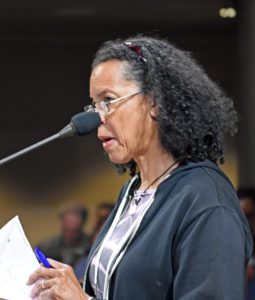Moratorium on Sale of Public Land Dies in Council Committee
Jul 20, 2018

By Ken Epstein
A proposed moratorium that would block the sale of public land until the City Council adopts a policy that guarantees “public land for public use,” died in the Community and Economic Development (CED) Committee this week.

Not a single member of the committee—neither Lynette Gibson McElhaney, Annie Campbell Washington, Larry Reid nor Noel Gallo—spoke in favor of the resolution or made a motion to approve it.
While the other councilmembers sat in silence, Councilmember McElhaney opposed the motion, which was supported by 22 speakers this week and many more when it came up at the last CED meeting.
McElhaney said that since the council has scheduled a public lands policy diuscussion for mid-October, “it almost seems that (the moratorium) is moot given that we’re going to make a final decision on a public lands policy” at that time.
Community members were left to wonder whether the council committee’s silence and inaction meant that they remain committed to selling public property before a transparent policy can be passed that restricts the long-standing process of making behind-doors, no-bid agreements with favored market-rate developers that have led to many protests at City Council meetings.
Speaking in favor of the moratorium, James Vann of the Post Salon Community Assembly pointed out that putting something on the agenda for October does not mean that it would be passed at that time.
“This has been going on for years,” said Vann. “Everything that comes before you is usually delayed again and again. The moratorium simply says, put the brakes on. Hold your horses. “Let’s not keep selling public land while we work this out. This will be an incentive to get the (ball) rolling and get this done by October. We need the moratorium.”
Gloria Bruce, executive director of East Bay Housing Organizations (EBHO), said, “I’m frustrated that you’re still resistant to putting the moratorium in place.” Jeff Levin of EBHO said, The point of a moratorium is to temporarily prevent the selloff of land, which would result in “making the public land policy meaningless.”
Community member Assata Olugbala said the community needs to see a moratorium in writing, quoting James Baldwin, who said, “I can’t believe what you say because I see what you do.”
“Don’t think of it like a moratorium,” she said, “think of it like a prenup. Even in a loving situation people get a written agreement that secures their best interests. Trust but verify.”
Mike Hutchinson said that a moratorium would not be necessary if councilmembers would refuse to sell property until there is a policy.
“We need a pledge from each City Council member that you will not vote for any more land sales until we have a policy,” he said.
“We need action, and the first action we need is relief from the threat of our public land being sold out from under us,” he added. “Where do each of you stand on the moratorium. This is a vote, and this is a decision we won’t forget.”
Esther Goolsby of Communities for a Better Environment emphasized the importance of affordable housing to Oakland’s homeless. “We need to put people in places—not storage units, not cages, not Tuff Sheds—actual homes,” she said.
Kathy Leonard reminded councilmembers that President Donald Trump is (only) concerned “about the wealthy, not the poor.”
If the council shows no concern for preserving public land for affordable housing, she asked, “How are we any different than Trump?”
Published July 20,2018, courtesy of the Oakland Post